Posts by Breakstone, White & Gluck
Toys Recalled in Summer 2013 Pose Choking Hazard, Injury Risks
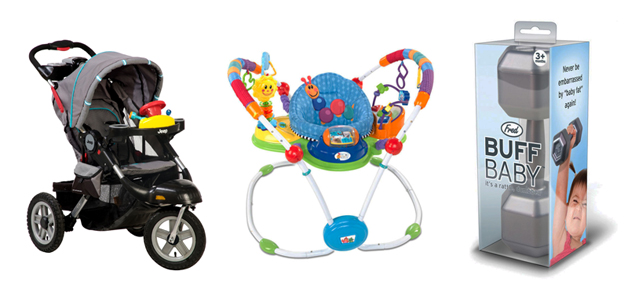
If you have young children, you have probably logged a few hours watching them play this summer. This joy of parenthood comes with an important responsibility: to make sure their toys are safe.
In the United States, the Consumer Product Safety Commission (CPSC) regulates the toy industry. Toys for children 12 and under are required to pass third-party testing and certification, but each year, defective toys still make it to store shelves and cause serious injuries and deaths. In 2011, more than 260,000 children were treated for toy-related injuries in the hospital emergency room and 13 were killed, according to the CPSC.
If you are a parent, be vigilant. Start by inspecting your children’s toys every time they play. Check the age labeling. Make sure they are no small parts that pose a choking hazard. When in doubt, set the toy aside and have your children play with something else.
Another way to protect your children is to stay informed. You may not see every toy recall on the TV news, but can visit the CPSC website and social media sites for news on toy recalls. A few recalls from this summer include:
Baby Einstein Musical Motion Activity Jumpers
Kids II voluntarily recalled about 400,000 Baby Einstein Musical Motion Activity Jumpers earlier this month. Another 8,500 activity seats have been recalled in Canada. The toy is linked to 61 injuries.
The hazard is when infants reach out and play with one of the attached toys (the toy with the smiley face), it rebounds back.
Kids II received 100 incident reports, including the 61 injuries. Injuries included bruises, facial lacerations and a 7-month-old boy who sustained a lineal skull fracture. In one case, an adult suffered a chipped tooth.
Kids II, which is based in Atlanta, Georgia, is the product importer. The toy was manufactured in China prior to November 2011. Kids II will replace the defective part for consumers for free. Many models were sold at Target, Toys R Us and Amazon.com between May 2010 and May 2013. Recall notice.
Kolcraft Jeep Liberty Strollers Kolcraft recalled 96,000 strollers in the United States after 39 reports of defective wheels. The inner tube can rupture, causing the wheel rim to fracture and fly off as a projectile. The reports included 18 injuries, most of which occurred when an adult attempted to fill a tire with air. Children and adults reported suffering lacerations, abrasions and contusions.
The stroller was manufactured in China. Kolcraft Enterprises, Inc. of Chicago, Illinois was the product importer. It was sold at Burlington Coat Factory, Sears and Toys R Us and other retailers from June 2010 to June 2013 for between $150 and $180.
Consumers are advised to stop using the defective stroller and contact Kolcraft for free replacement wheels. Recall notice.
“Buff Baby” Baby Rattles
In June, Fred & Friends announced the voluntary recall of 47,500 “Buff Baby” baby rattles in the United States. The rattles, which are designed to look like a dumbbell weight, are designed for children 3 months and older. The rattles were recalled because they pose a choking hazard to young users. The cap can separate and expose the plastic pellets inside to infants. Fred & Friends received two reports of this happening, but no injuries.
The rattles were sold in specialty toy and baby stores nationwide and in Canada, as well as online through Amazon.com and other websites from October 2011 through June 2013.
Consumers are advised to stop using the rattles and contact Fred & Friends for a full refund. Fred & Friends, which is located in Cumberland, Rhode Island, is the distributor. The toy was manufactured in China. Recall notice.
Thermobaby Bath Seats Recalled Due to Drowning Hazard
The Aquababy Bath Ring was recalled after the CPSC determined it does not meet federal safety standards. The product is supposed to hold children secure in the bath, but the design poses a risk for tipping over.
SCS Direct Inc. of Milford, Conn. voluntarily recalled 7,500 of the bath seats. There were no injuries involved in this recall. The seats were designed for children five months to ten months old. It was sold through Amazon.com. Consumers are advised to stop using the product and contact SCS Direct for a $35 refund. Recall notice.
Read More
Amusement Park Accidents are Investigated Differently in Massachusetts and Texas
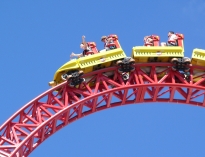
Student Athlete Concussions Not Being Reported by Massachusetts High Schools
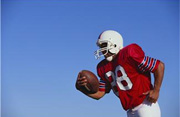
Only 31 percent of Massachusetts high schools and middle schools complied last year with a state law mandating reporting on student athlete concussions. State officials are hoping for greater compliance when new figures come due August 31.
In 2010, Massachusetts passed a law aimed at identifying and preventing concussions among student athletes. Under the law, 689 public and private schools were required to report data for the 2011-2012 academic year. However, only 213 schools submitted figures, and those figures showed that 3,450 students had suffered a head injury or suspected concussion in sports. The figures were recently reported in The Boston Globe.
To encourage reporting this year, the state has changed its form to make deadlines appear more prominent and provide definitions for data.
Massachusetts Law
A concussion is a mild traumatic brain injury caused by a force to the head, such as a fall or car accident. Symptoms typically include headaches, dizziness and memory problems. Left untreated, it can result in long-term brain impairment. In recent years, focus has been on preventing concussions in sports at every level, from the National Football League (NFL) to high schools down to Pop Warner football leagues.
Massachusetts is one of 47 states which have passed so-called “return to play” laws since 2009. The state of Washington passed the first concussion in sports law in 2009.
The Massachusetts sports concussion law requires students, parents and coaches to receive annual training to recognize the signs of a concussion. Students who sustain a concussion are required to sit out and obtain a doctor’s written permission to return to the game.
As a final step, schools must report figures to the Massachusetts Department of Public Health (DPH). Public schools and those subject to the rules of the Massachusetts Interscholastic Athletic Association (MIAA) must comply with the law.
Sports and recreational activities cause 3.8 million concussions each year in the United States, according to the Centers for Disease Control and Prevention (CDC). When an athlete suffers a concussion, they become at risk for suffering another one. Proper rest is important, and teenagers, along with older adults and young children, are believed to have longer recovery periods.
If you are the parent of a student athlete, summer is a good time to learn about the law. Ask your child’s coach when the school will hold concussion training sessions. You can also read a summary of the Massachusetts sports concussion law.
Related:
State revises concussion reporting after weak response from schools, The Boston Globe.
Product Liability: Retailer Fined $3.9 Million for Illegal Sale of Children’s Clothing with Drawstrings
Last month, a discount retailer agreed to pay one of the largest fines ever issued by the Consumer Product Safety Commission (CPSC). The civil penalty settles allegations over illegal sales of children’s clothing with drawstrings.
The CPSC announced that Ross Stores, based in Pleasanton, California, agreed to pay a $3.9 million penalty and implement compliance programs. From January 2009 to February 2012, the CPSC alleges that Ross Stores knowingly failed to report that it sold or held for sale about 23,000 children’s upper outerwear garments with drawstrings at the neck or waist.
Under federal law, manufacturers, distributors, and retailers must report to the CPSC within 24 hours of learning about a defective product which may create a substantial product hazard. They must also report those which create an unreasonable risk of serious injury or death or fail to comply with CPSC regulations.
In July 2011, the CPSC issued a final rule and determined that children’s upper outerwear garments in certain sizes present substantial product hazards. The ruling should have taken the majority of children’s clothing with neck, hood and waist strings out of stores.
Ross Stores has now been fined twice over drawstring clothing for children. In 2009, it paid a $500,000 fine for failing to report it sold garments between 2006 and 2008.
The CPSC has received over two dozen reports of children suffering injury and wrongful death when clothing drawstrings get caught on playground equipment or vehicle doors. Since passing its 2011 rule, it has issued 8 recalls. In 2011, the CPSC also fined Macy’s $750,000 for selling children’s upper outerwear with drawstrings.
Related:
Ross Stores Fined in Sales of Defective Clothing, New York Times
Massachusetts Boating Accidents Increased in 2012
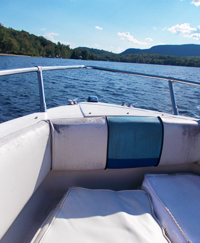
For Massachusetts boaters, a day on the water resulted in more injuries last year, according to state figures.
In 2012, Massachusetts saw 68 reported boating accidents, resulting in 17 deaths, according to the state Executive Office of Energy and Environmental Affairs. This was an increase from 2011, when there were 46 reported boating accidents and 9 deaths.
Nationally, there was a significant decrease in reported accidents. In 2012, 651 boating accidents were reported, down from 758 in 2011, according to the U.S. Coast Guard.
Massachusetts Environmental Police enforce the state’s boating laws and investigate recreational boat accidents on coastal and inland waters, except private lakes and ponds and those smaller than 10 acres. If you are in a boating accident involving personal injury, death or property damage over $500, you are required to report it.
Our Boston injury attorneys offer these safety tips for boating off Boston Harbor, Cape Cod or your favorite spot:
Wear life jackets. Many drownings and accidents result from failure to wear life jackets or not having appropriate life jackets onboard. In Massachusetts, children under 12 are required to wear life jackets on boats at all times and boats must have one life jacket on board for every passenger.
Life jackets are required for users of personal watercraft, such as Jet Skis.
Avoid alcohol. Avoid alcohol consumption while operating a boat. Alcohol use is involved in up to half of teen and adult deaths associated with water recreation, according to the Centers for Disease Control & Prevention.
Operating a boat under the influence is against the law in every state in the United States. In Massachusetts, the criminal punishment can include imprisonment, fines and a loss of motor vehicle license and boating registration for one year. If a boater causes serious bodily injury to another person, they may be imprisoned for up to 10 years and fined up to $5,000.
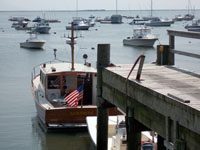
Training. The state’s Boat and Recreation Vehicle Safety Bureau offers training, which is mandatory for younger boaters but available to others as well.
Avoid swimming areas. In Massachusetts, boaters are prohibited from operating within 150 feet of shorelines used as swimming areas. You must stay more than 75 feet away from floats and markers that line designated swimming areas.
Beware of other boaters. Travel the permitted speed (generally 45 miles per hour on inland waters) and slow down as you approach other boaters. Your boat’s wake can cause another boat operator to lose control or injure the passengers.
Traveling with passengers. Do not exceed your boat’s passenger limit. Ask all your passengers to wear life jackets, especially young children. When you refuel your boat, ask your passengers to step off the boat. Make sure you have the right amount of food and water.
If you are traveling with children, explain the safe areas to sit, how to properly board the boat and what they cannot touch.
Aging or broken boat equipment. Before each season, have your boat checked for equipment failures. The Coast Guard offers free vessel checks or you ask your local boatyard. You can also check the government boat recall database.
Boating at night. It is best to boat during daylight, but if you go at night, make sure you have the proper navigation lights and limit your passengers so you can focus on operating the boat.
*********
Related:
State Environmental Officials Urge Residents to Follow Safe Boating Practices, Executive Office of Energy and Environmental Affairs.
Massachusetts Boating Law Summary, Executive Office of Energy and Environmental Affairs.
Breakstone, White & Gluck Donates 175 Helmets to Somerville Bike Safety Day
Bike Safety Day in Somerville is always a great way for children to kick off a summer of safe bicycle riding. This year, Breakstone, White & Gluck was pleased to participate, donating 175 helmets to the Somerville Kiwanis Club for distribution to children from the Winter Hill Community School. Over 130 children were fitted for helmets that day and the school was given the rest to give students individually as needed.
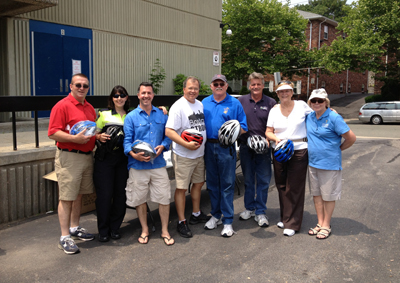
Above photo includes: John Welch, Winter Hill School Re-Direct Officer; Somerville Police Officer MaryAnn Manfra; David Blumsack, Somerville Kiwanis Club Event Organizer; attorney David White of Breakstone, White & Gluck; George McLean of the Somerville Kiwanis Club; Nancy Bushnach of the Somerville Kiwanis Club and Ellen O’Brien of the Somerville Kiwanis Club.
The event is hosted annually by the Somerville Kiwanis Club and was held at the Winter Hill Community School playground on June 22. Children who registered in advance came out with their bikes for a free inspection, helmets and reflectors. Children and parents then had to test out their new skills on bike safety obstacle courses.
As part of the event, children registered their bikes with the Somerville Police Department and were given fingerprinting kits.
The helmet donation was part of Breakstone, White & Gluck’s Project KidSafe, launched this year. To date, our firm has donated over 900 helmets and is on track to donate 1,000 by the end of summer.
Our Boston lawyers have donated helmets to children in need through these programs: Boston Bikes’ Roll It Forward program, CYCLE Kids in Cambridge, Boston Cyclists Union and the Dedham Bike Rodeo. Bikes Not Bombs of Jamaica Plain was given a monetary donation to support its youth programming.
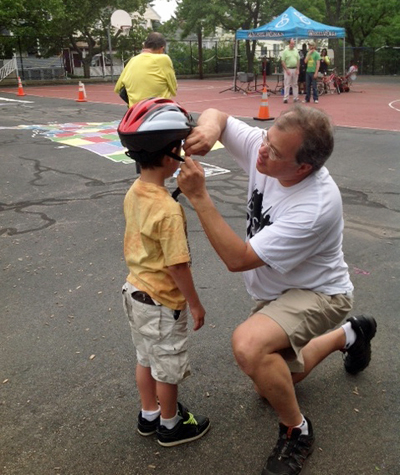
Above: Attorney David White of Breakstone, White & Gluck of Boston.
Below: Somerville Police Office MaryAnn Manfra.
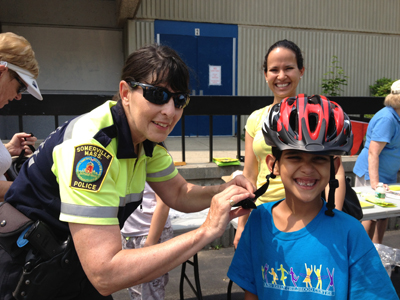
Take Extra Precautions with Propane Gas Grills This Holiday
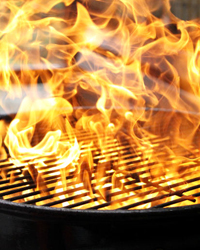
For many of us, Fourth of July celebrations start with a barbecue grill. Many are powered by a propane gas tank and require special care in handling. Propane is an invisible, but highly flammable gas which can trigger an explosion if it leaks and comes into contact with fire.
When grills are not properly used or maintained or are left unattended, accidents can occur. There are several safety concerns associated with grills, including propane leaks, cooking burns and fires. In the last year, there have also been a few product recalls involving grills.
Propane Gas Leaks and Explosions
Protect your propane gas tank from leaks. Take care when transporting it to your refilling station. Place it in a secure box and return it immediately home after filling it. Have it inspected annually by a qualified professional.
Store the propane gas tank outside your home. Also keep it away from your garage or any deck attached to your home. These areas may seem safe to use because they are not living areas, but according to the U.S. Fire Administration, more than half of all residential grilling fires in the U.S. begin on porches, terraces, exterior balconies and similar areas.
Grilling Burns and Structure Fires
When grilling, the safest solution is to stay outside your home or apartment building, as far away as you can.
This protects your home as well as your guests and young children who are too often victims of grilling burns. According to the National Fire Protection Association, children under age 5 accounted for about one quarter of all thermal burn injuries in 2007. Many of these burns occur when children are curious and touch or bump up against the grill.
If you live in an apartment building or multi-unit dwelling, you may also want to check with your property manager and city and town offices for additional information. Massachusetts state law does permit use of propane grills on first floor porches only, but some cities have gone a step further. For instance, the city of Boston does not permit either propane or charcoal grills above ground floor porches. Grilling on rooftops is not permitted either.
Before heading out to the grill, review the manufacturer’s instructions first. If you no longer have the instructions, check if they are available on the manufacturer’s website.
Use long-handled grilling tools and avoid wearing loose clothing. Work neat and remove grease and fat build-up from the grills.
Finally and most important, never leave the grill unattended. If you need to step away for a minute, finish up your cooking and turn the grill off.
Grill Recalls
Check the Consumer Product Safety Commission and your manufacturer’s website to see if there have been any recalls involving your grill. When a grill is recalled, you may be asked to return it to the manufacturer or retailer for a refund or be given instructions to replace a part.
In April 2012, more than 87,000 gas grills sold in the U.S. were recalled by One World Technologies, and another 1,400 in Canada. The company offered consumers a replacement regulator after receiving 569 reports its grills were leaking propane gas. The defective grills were sold at Home Depot stores nationwide and Directory Tools Factory Outlet stores from March 2011 through February 2012.
No injuries were reported at the time of the recall.
Another recall came in November 2012, when 37,000 Master Forge Gas Grills sold at Lowe’s Stores were recalled due to fire and burn hazards. In that case, consumers were asked to contact the manufacturer, Guangdong Vanward Electric Co., Ltd., of China, for revised instructions and a warning label that showed how to properly install the hose and regulator.
At the time of the recall, the manufacturer reported two reports of hoses melting and rupturing, but no injuries. The defective product was sold at Lowe’s stores nationwide from November 2011 through May 2012.
Pool Guests Swim with Caution
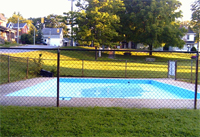
After another long winter here in Massachusetts, many of us are looking forward to some time by the pool. Whether you are a homeowner or a pool guest, take time to consider the rules of safety now so you can enjoy this time of year.
As a homeowner, you have a responsibility to keep your home reasonably safe for your family and your invited guests. If you own a pool, you have additional legal responsibilities to keep the swimming area safe. A safe swimming pool is critically important when children live at home or will be visiting. In fact, one third of all children who die between the ages of one and four are drowning victims in pools and spas, and hundreds more are critically injured.
Massachusetts regulates home swimming pools very closely. Here are some of the legal requirements and some common sense tips for the poolside.
Fencing. The law in Massachusetts requires homeowners to enclose pools with a fence at least four feet tall. It must have a self-closing lock which opens outward from the pool. Homes with a back door that opens onto a pool deck must have a pool alarm.
Diving Boards. Diving into a pool presents the risk of severe personal injury due to head and neck injuries. Diving boards are regulated for their size and height over water, and the water should be at least nine feet deep in the diving area. Shallow areas should be marked to prevent diving board injuries. Many insurance companies will request that your remove your diving board entirely as a safety precaution.
Pool Drains. Ask the pool owner where all the pool drains and suctions are and make sure your child steers clear of them. When a child is pulled into suction, they can become entrapped with a strong force, causing drowning and death. Make sure your child is not wearing any loose hair accessories or a bathing suit with loose straps that could get pulled in. Federal law changed in 2008, requiring public pools to start using drain covers to reduce suction deaths, but private homeowners may not have made the change.
Portable and Inflatable Pools. Though they are much smaller than in-ground pools, portable and inflatable pools can pose serious risks for injury, especially to toddlers.
Pool Slides. Whether it is a fixture or an inflatable, ask yourself if a slide looks like it can support you without tipping over. Ask the homeowner how long they have had the slide and if there have been any problems. In 2006, a woman died in Massachusetts after using a Banzai brand inflatable slide. The now-recalled slide collapsed under her as she slid down. She struck her head and later died.
Watch Children Closely. Give your children your complete attention while they are near the pool. Drowning claims more lives among children ages 1 to 4 than any other cause except birth defects, according to the Centers for Disease Control and Prevention. It is the second leading cause of unintentional injury-related death for children and teens ages 1 to 14. Set aside your cell phone, magazines and other distractions and watch your children. If you are in a group of adults, take turns being the “pool watcher.” Have that person step a few feet away from the conversation and concentrate solely on watching the children.
Poolside Toys. Avoid any toy or equipment that is not meant for use at the pool, including trampolines. Inspect all equipment before use.
Broken Glass. Serious accidents can happen when beer bottles and other glass are used near the pool. Broken glass at the poolside is obviously dangerous, so it makes sense to use only plastic or metal containers near the pool. Glass in the pool is even more dangerous–clear glass simply cannot be seen in the water, and will be a serious hazard to anybody using the pool. If there is broken glass in the pool, the only safe remedy is to drain the pool to sweep it out.
Distracted Driving Study: Voice Recognition Software Not Safer
 Talking, e-mailing and texting in the car are not any safer with voice recognition software, a new study finds.
Talking, e-mailing and texting in the car are not any safer with voice recognition software, a new study finds.
Infotainment systems – those digital screens in a vehicle’s dashboard – are becoming more standard in cars. They have voice recognition software which allows drivers to talk on the phone hands-free or send e-mails and text messages by voice. You can ask your GPS for directions, go online and even log into social media sites, such as Facebook and Twitter, all while driving, though these practices are unsafe.
While the federal government seeks industry support to limit use of these features while cars are in operation, the speech-to-text technology is legal in all 50 states. It provides an alternative in the 11 states and District of Columbia which ban cell phone use for all drivers. Massachusetts is one of the 41 states and District of Columbia which ban texting while driving for all operators, though drivers over 18 can talk on cell phones.
Distracted Driving Study
The new study by the AAA Foundation for Traffic Safety shows that putting the phone down and talking is still a risk. The study reported that speech-to-text technology causes a higher level of cognitive distraction than other activities behind the wheel, such as listening to a book on tape, the radio or talking on a hand-held phone or hands-free phone. Researchers compared drivers undertaking the different activities with eye-scanning technology that measured where driver attention was focused and electrical activity in the brain.
The study was led by David Strayer, a neuroscientist at the University of Utah who researches driving behavior and car accidents. He was the same researcher who led the 2006 University of Utah study.
Distracted Driving Concerns
In 2013, 9 million systems will be shipped in cars worldwide, according to ABI Research, an industry research firm. The number is expected to rise as automakers push the technology.
This technology meets heavy government concern about distracted driving. In 2010, 3,092 people were killed in car crashes related to distracted driving, according to the National Highway Traffic Safety Administration.
Recently, National Transportation Safety Board Chairman Deborah Hersman called for a ban on all phone conversations behind the wheel, even with hands-free devices. Last December, the federal government released voluntary guidelines for the auto industry, recommending that many infotainment system features be disabled while cars are in use. The recommendations seek to prevent drivers from manually enter messages, read messages, browse the Internet and make video conference calls while driving.
Read More
Trampolines, Inflatable Slides Among Dangers At Swimming Pool

Every year, thousands of people in the U.S. die in drownings. Many of these are young children who drown in swimming pools. Last summer alone, nearly 140 children under age 15 drowned in swimming pools and spa tubs, according to the Consumer Product Safety Commission (CPSC).
While the risk of personal injury and wrongful death from drowning has long been known, new dangers have emerged at pools in recent years. As many homeowners have removed diving boards for safety and insurance reasons, many others are purchasing inflatable slides, sports nets and trampolines to enjoy by the pool.
Two recent Massachusetts cases touch on these risks. Last month, the Supreme Judicial Court ordered a new trial in Dos Santos v. Coleta, where the plaintiff was paralyzed in 2005 when he jumped off a trampoline and struck his head in a two-foot inflatable wading pool. The pool and trampoline were owned by his half brother, the defendant.
The SJC found the trial court judge provided improper instructions when he said the jury could stop deliberating if they concluded the danger of jumping off a trampoline and into the pool was “open and obvious.”
The SJC ruled that the trial judge should have also instructed that a property owner is not relieved from correcting such dangers in cases where they can or should anticipate that the dangerous condition will cause harm.
“Because we conclude that a landowner has a duty to remedy an open and obvious danger, where he has created and maintained that danger with the knowledge that lawful entrants would (and did) choose to encounter it despite the obvious risk of doing so, we now reverse,” wrote Justice Cordy.
The plaintiff, Cleber Coleta Dos Santos, had been playing with his young son on the trampoline when he attempted to flip off and into the pool at his half brother’s Framingham home. He suffered permanent paralysis. His half brother and sister-in-law owned the home, but had moved out a few days prior, leaving the trampoline positioned next to the pool where it could be used in the backyard. The SJC noted that the homeowner disregarded warnings printed on the side of the pool against jumping or diving into the pool.
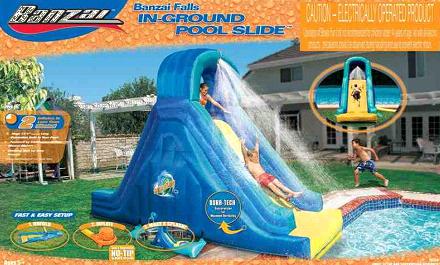
The Banzai inflatable slide is another product which has caused injury and death in Massachusetts in recent years.
You should not see any Banzai slides for in-ground pools this summer. They were recalled in May 2012, after a woman’s death in Massachusetts and two reports of serious injury in other states. The inflatable slides were designed to sit on the edge of a pool so swimmers can climb to the top and slide down as water sprays. But the structure easily deflated, removing support for the user. It was also easy to knock down, even without windy conditions.
In 2006, a 29-year-old Colorado mother visiting Massachusetts fractured her neck and struck her head while using a Banzai inflatable slide. When she stepped up and started to slide, there was not enough support and her head hit the pavement near the edge of the pool. The slide had been partially deflated. The woman died the next day at a Boston hospital.
In October 2011, a jury in Salem Superior Court ordered Toys R Us to pay more than $20 million to the woman’s family, finding the Banzai slide did not comply with federal safety standards for swimming pool slides. Toys R Us had sold the product to the victim. Amazon.com – the website where the product was sold through – and manufacturer SLB Toys USA settled with the woman’s family after the trial began.
In May 2012, Walmart and Toys R Us recalled 21,000 Banzai slides for in-ground pools, asking consumers to return the product for a full refund. Banzai continues to sell inflatable slides and water castles which are stand alone.
Toys R Us recently appealed the case to the Supreme Judicial Court, arguing the the Consumer Product Safety Commission regulation cited by the woman’s family does not apply to inflatable pool slides, but only to rigid pool slides.

